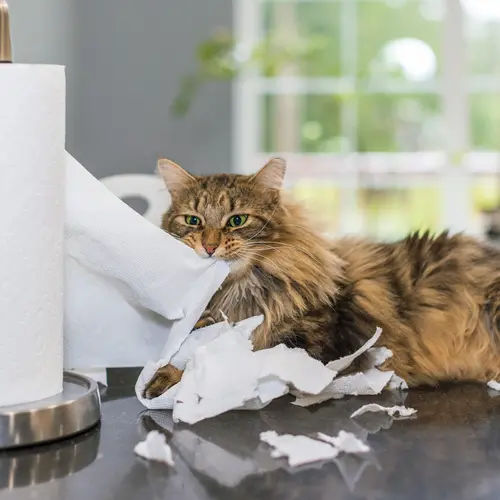What Is Feline Infectious Peritonitis?
Feline infectious peritonitis (FIP) is a viral disease caused by a feline coronavirus that affects wild and domestic cats. This type of coronavirus is different from the coronavirus that causes COVID-19 in people.
Feline coronavirus is very common and usually doesn't cause any serious issues, aside from mild diarrhea. But when the feline coronavirus changes to a specific strain of the coronavirus, FIP can develop. In about 10% of infected cats, the virus will multiply and mutate, resulting in an infection known as feline infectious peritonitis virus (FIPV) that spreads throughout the cat’s body. It can cause an extreme inflammatory reaction in the tissues surrounding the abdomen, kidney, or brain.
Although FIP is not believed to be contagious, it is a very serious disease. When a cat gets FIP, it is progressive and almost always fatal.
FIP Symptoms
Early signs of FIP can vary but often include a rising and falling fever, loss of appetite, and energy loss. As time goes by, infected cats may have more FIP symptoms that depend on the form of FIP.
FIP comes in a "dry" form and a "wet" form. Infected cats can have symptoms of only one form or a combination of both.
Dry form. The dry form of FIP causes infection and inflammatory lesions around the blood vessels in a cat’s body. This infection can affect the brain, liver, kidneys, lungs, and skin. This form often causes the cat to have seizures and move in an abnormal or uncoordinated way. In some cases, cats will also have excessive thirst and urination, vomiting, weight loss, and jaundice.
Wet form. With this form of the disease, fluid builds up in the abdomen, which causes a pot-bellied appearance. Fluid may also build up in the chest, making it hard for the cat to breathe. This form of FIP causes damage to the blood vessels, resulting in inflammation and fluid leaking from the blood into the abdomen and chest.
Once a cat has FIP in either form, the symptoms tend to get worse with time. Euthanasia (or putting the cat “to sleep”) is often necessary in a matter of weeks or months.
Diagnosis of FIP in Cats
FIP is difficult to diagnose. Many of its symptoms could also be symptoms of other issues, and there is no single blood test available to confirm FIP. Your veterinarian is more likely to assume FIP is present if your cat:
- Has a low number of white blood cells
- Has an unusually high number of white blood cells
- Has elevated concentrations of protein in the blood
- Shows yellowing of the gums or eyes
- Is in a higher risk group (young cats or cats living in an overcrowded environment)
If there is a build-up of fluid in your cat’s abdomen or chest, your veterinarian may collect a sample of the fluid for testing. Fluid with a high protein percentage is an indicator of FIP and will frequently be yellow-tinged. If FIP is suspected, your veterinarian may take an X-ray or ultrasound of your cat.
There are a few other tests that may help support a FIP diagnosis. The immunoperoxidase test can detect white blood cells infected with the virus. Polymerase chain reaction technology can be used to test for the virus in the tissue or body fluid. Sometimes, a biopsy of the infected tissue inside the abdominal cavity may be performed.
Although these tests can help support a veterinarian’s diagnosis, none of them is 100% accurate.
FIP Treatment Options
FIP has long been considered an untreatable disease. It wasn’t until recently that antiviral drugs were introduced to help treat FIP. These drugs are not yet approved by the Food and Drug Administration (FDA), and their long-term effectiveness is still unknown.
Other FIP treatments may include supportive care, such as drainage of built-up fluid, and blood transfusions.
You should consult your veterinarian to help you decide which treatment option is best for your cat.
Is There a Vaccine for Cat FIP?
While a FIP vaccine is available, it has not been proven effective and is not recommended by the American Association of Feline Practitioners Feline Vaccine Advisory Panel. While the vaccine may be safe, risks should be weighed carefully. Before starting any new vaccine or treatment, you should talk with your veterinarian.
Because FIP develops after the feline intestinal coronavirus mutates, the best way to prevent FIP in your cat is to avoid the coronavirus's initial infection. To prevent infection, the following is recommended:
- Keep your cat as healthy as possible.
- Keep litter boxes clean.
- Keep litter boxes away from food and water dishes.
- If you own multiple cats, keep a maximum of three cats in each room to prevent overcrowded living conditions.
Dealing with a sick cat can be scary. A veterinarian can help you determine the best steps to take care of your cat.
